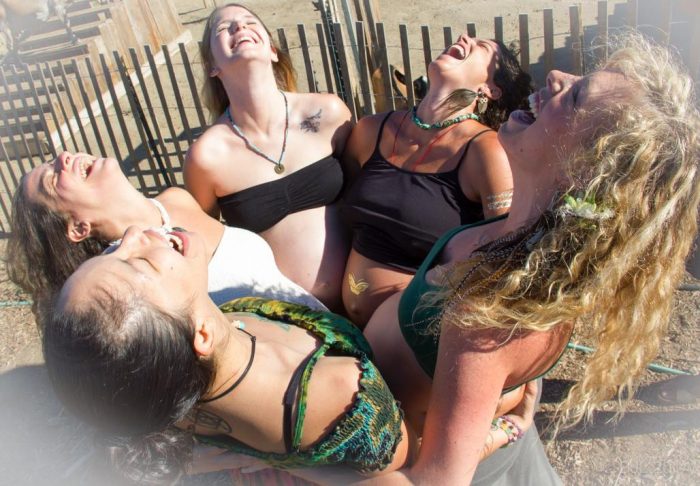Can Community Cure Cancer?
Composed by Gina Tang (IG: @tangwilltell)
Like other epic tales, my story begins in the middle of action.
Home alone with two kids under the age of four. The youngest with intense vomiting and diarrhea since the evening before. Me, feeling wobbly and weak. Needing Pedialyte, coconut water, anything to help hydrate the baby. The toddler temperamental, testing my patience and dignity both.
Although the details are specific, my underlying experience is familiar: overwhelm, anxiety, and stress. These feelings magnify when I witness the way I’m being with my kids—because I don’t intend to imprint on them like this.
I text my partner, who won’t be home for another seven hours. “I need help! This is so hard.” We’ve lived in San Jose less than six months. No family nearby, and exactly two friends. It’s like I’m falling right through the holes in my support system.
Mind flailing, I decide to go out on a limb. Hail Mary. In a game-changing moment of complete vulnerability, I pull up the group thread for my daughter’s preschool, Mindful Ways. And because this isn’t an ordinary preschool, but a heart-centered hub for parents and practitioners with a village-minded, eco-social perspective, I go off-topic and post a desperate plea for help.
“Help!” is literally the first word to arrive in the email inboxes of 21 people of whom I’ve only just met. It’s followed by a blunt description of my current scenario, and a direct request for Pedialyte (dye-free) and coconut water.
The Program Director calls me less than fifteen minutes later with a plan to get me the goods.
Two minutes after that, another mom (with four kids of her own) lets me know that she is going to Safeway in my neighborhood, and asks if there is anything else I need. She suggests saltine crackers and offers to pick up food for dinner, too.
As this is happening, something in my neurology shifts. I know this, because my toddler is doing the exact same thing as before—whining and whacking at the floor—but suddenly my entire tone toward her is different. I’ve sprung a wellspring, in which the compassionate and patient phrasing and perspective I strive for as a parent flows as naturally as snot from a nose.
Oh, says that voice in my head, here’s what it feels like to mother from a place that feels supported, safe, held, seen, and inter-connected.
Over the course of the evening, four more mothers reach out to me. One of them has infant triplets and a toddler. Mind-blown over the generosity of spirit possessed by the people in this community, I’m reminded that it really, actually and truly does take a village. And experiencing it today—not just as theory, but as trial-tested fact—changes the way I’m moving forward.
Here’s how.
Later that same night, I happen to be watching a 9-part docuseries called Interconnected that is evolving the way I think about my body, my diet, and my health. Episode Seven deals with the relationship between a healthy gut microbiome and cancer. One scientist describes the psychology of a cancer cell: a cell so damaged that it no longer knows who it is. It doesn’t experience itself as part of a whole, and in a desperate survival attempt—a reaction to perceived isolation—it senselessly divides and multiplies.
I’m thinking about how Western culture has “normally” treated new mothers, and how standard practices (single family households, ideological warfare, institutional authority) have kept us secluded, sequestered, and separated. How narratives of isolation are embedded before a baby is even born. How depression rates are so high, while breastfeeding rates are so low. How breast cancer seems to be taking ahold.
The scientist says, “Sugar and stress feed cancer cells.”
Something clicks. Even though I have heard this before. Even though I’ve committed to reducing or eliminating sugar from my diet before (many times). Even though I know how chronic stress affects my overall health.
When I sit in this one-bedroom apartment feeling isolated and indifferent, eating sweet things and drinking caffeine—even if they are organic—I am acting like a cancer cell. Vibrating cancer vibes. Aligned with malignancy, malware, defection. The problem is not sweets, nor coffee, nor any other substance. Addiction is not a disease. Addiction is a symptom. I daresay cancer is a symptom, too.
I can’t do this, I am not enough, I am inadequate, I am alone. This is not where or how I should be. How many among us have these beliefs in our bones, operating behind the scenes? Even if they’re subtle. Even if they only surface in certain scenarios.
I’ve struggled for decades with the effects of excessive sugar and stress. Sometimes I criticize my “lack” of “willpower” to quit snacking or relax. But in fact, the behavior is rooted in a fundamental, formative experience of isolation and disconnect, hard-coded into my subconscious via the mechanism of inter-generational trauma.
Today, in this midst of feeling afraid and alone, I had an experience of being connected to a whole. That I am at home. It didn’t matter that I don’t “know” the folks here, yet. Receiving the direct support and witnessing presence of others in my time of need completely altered my operating system. When I have this level of connection on a regular basis—if I live on a big property with a few other families, for example, or have daily intentional interaction with people who see and believe in my whole-being—how does my behavior change? How does my mind-frame shift?
I can survive, for a time—or I can thrive, and have the time of my life.
I’ve noticed, again and again, that when my body-mind feels good and grounded, I don’t crave anything. I don’t self-destruct. I don’t mindlessly multiply my misery.
Developing and nurturing the conscious and subconscious belief that I am fundamentally valuable, worthy of protection, deserving of prosperity, and connected to a loving and compassionate whole, assists me in coming home to the essence of who I am—and, it seems fair to say, may aid in the prevention of depression, dependence, and dis-ease.
I am not a doctor, and I have never received a cancer diagnosis. I don’t pretend to know anything whatsoever. I’m simply reporting on what I sense and suspect. Pure speculation. Here it is, stripped to a nutshell.
- Sugar & stress feed cancer cells.
- Isolation feeds addiction & stress.
- Community heals isolation.
- Therefore, community cures cancerous behavior.
I would like to thank the members of the Mindful Ways Eco-Village Institute and the makers of the Interconnected docuseries for coming together on the same day to remind me to reflect on this one crucial question: Who am I, and how am I doing here?









Read 2 comments and reply